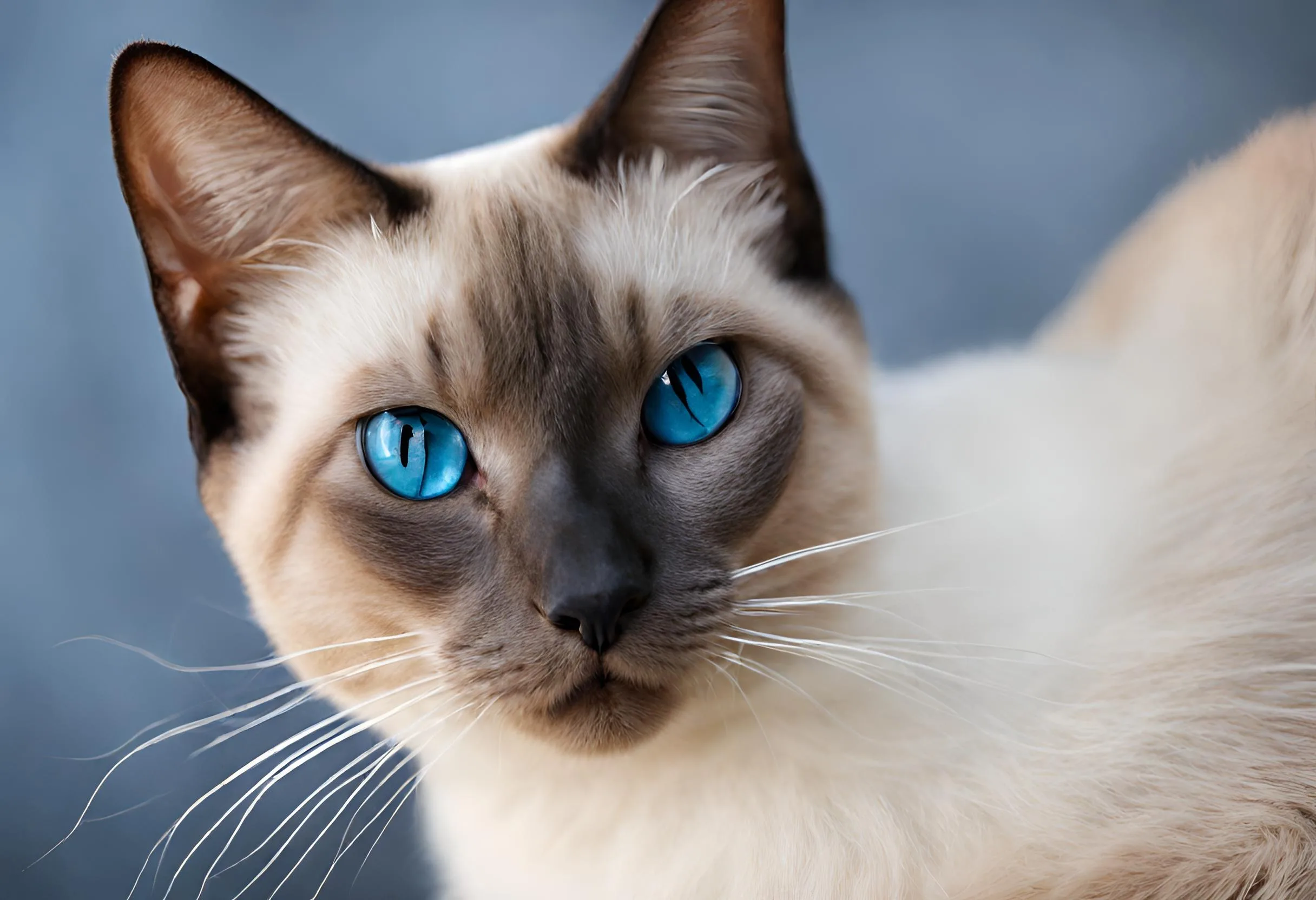Siamese cats captivate pet lovers worldwide with their mesmerizing blue almond-shaped eyes, distinctive coat patterns, and delightful vocal charm. These majestic felines not only grace your home with their unique appearance but also enrich it with their vibrant presence and intelligent companionship.
Table of Contents
Introduction to the Siamese Cat Breed
The Siamese breed is an ancient one, with roots tracing back to Thailand, then known as Siam. They were once the royal cats of Siam and are believed to have been present in Europe and North America as far back as the 19th century. Siamese cats are distinctive for their vocal and social nature, sleek and elegant body type, as well as their short, fine coat with color points that accent the ears, face, paws, and tail.
A Brief History
The Siamese cat’s history is shrouded in mystique. A favorite of the royal and elite classes, they were kept in temples and palaces as an emblem of good fortune and protection. In the 1800s, they were first brought to Europe and the United States, where their exotic features earned them a special place among cat lovers.
Physical Characteristics
Siamese cats are known for their unique coat coloration, a result of a genetic mutation that leads to partial albinism. Their fur points are usually a darker shade, ranging from subtle cream to intense seal brown, chocolate, blue, or lilac. Their distinctive “meezer” calls and their social aptitude mean they are rarely out of sight or sound of their human family members.
Siamese Cat Personality Traits

The Siamese cat’s personality is as distinctive as its looks. They are intelligent, curious, and at times, tirelessly active. Siamese cats tend to be deeply attached to their humans and can develop an almost dog-like loyalty. They are not shy about sharing their thoughts and feelings, often engaging in long, meowing “conversations” with their favorite people.
The Talkative and Affectionate Nature
What truly sets the Siamese cat apart from other breeds is their vocalization. Siamese cats love to chat, using a variety of sounds to convey their emotions and needs. They thrive on interaction and are known for their affectionate nature. This need for communication and bonding makes them an excellent choice for owners seeking an outgoing and involved pet.
Intelligent and Creative
Siamese cats are extremely intelligent and agile, often displaying a cunning and mischievous streak. They are known to open doors, climb to new heights, and can even be trained to perform tricks. Their inquisitive nature means they need mental stimulation, whether through interactive play or puzzle toys. Neglecting their need for activity can lead to behavioral issues such as excessive meowing or destructive behavior.
Living with a Siamese Cat
Creating a harmonious home with a Siamese cat means understanding and catering to their needs. Here are some key tips for providing a fulfilling lifestyle for your “meezer.”
Home Environment and Safety
A Siamese cat’s curiosity may lead them into mischief, so it’s crucial to ensure your home is safe and stimulating. Provide high perching spots, such as cat trees and window ledges, to satisfy their desire to survey their kingdom. Secure your windows and balcony to prevent escapes. Siamese cats are known to be territorial and may react negatively to the presence of other cats, so it’s best to introduce new pets slowly and under proper supervision.
Grooming and Hygiene
Siamese cats have a short, fine coat that requires minimal grooming. A weekly brush to remove loose hair and regular nail trimming is usually sufficient. Additionally, brushing your cat’s teeth and providing dental treats can help maintain their oral hygiene. Ensure a clean litter box is always available in a quiet location to satisfy their fastidious nature.
Nutrition and Exercise
Feed your Siamese cat a balanced diet appropriate for their age, weight, and activity level. Siamese cats are known for their slim build, so it’s important to monitor their food intake to prevent obesity. Regular playtime with interactive toys and games will keep them physically and mentally engaged. Engage in regular, scheduled play sessions to strengthen your bond and keep them entertained.
Siamese Cat Health Considerations
Siamese cats, like all purebred cats, are susceptible to certain hereditary health issues. Responsible breeding practices and attentive care can mitigate potential problems.
Hereditary Health Conditions
Some common health concerns in Siamese cats include feline asthma, which may be exacerbated by stress, and progressive retinal atrophy, an eye condition that can lead to blindness. They can also be prone to glaucoma, liver amyloidosis, and certain heart conditions. Familiarize yourself with their breed-specific health risks and monitor their well-being closely.
Regular Vet Check-ups
Regular veterinary visits are essential for all cats, but especially for Siamese cats due to their predisposition to certain conditions. Your veterinarian can provide guidance on vaccinations, parasite prevention, and early detection of health issues. Siamese cats can live long lives, with some reaching 15-20 years, so proactive health management is key.
Siamese Cat Breeding and Adoption
Becoming a Siamese cat owner through responsible adoption or good breeding can be a deeply rewarding experience.
Responsible Breeding
Ethical breeders prioritize the health and well-being of their cats, striving to produce healthy lines without genetic defects. When seeking a Siamese kitten from a breeder, ensure they provide comprehensive health records and genetic testing. Visit the cattery in person to assess the living conditions and the cats’ socialization.
Adoption and Rescue
Adopting a Siamese cat from a rescue or shelter not only gives a deserving cat a second chance at a happy life but also aligns with responsible pet ownership. Many purebred cats end up in shelters due to no fault of their own, and there are often breed-specific rescue organizations that can help you find the perfect Siamese companion.
Conclusion and Call to Action
Siamese cats are a unique and wonderful addition to any home. Their intelligence, social nature, and regal demeanor make them a cherished member of the family for those who are committed to providing them with a fulfilling life. Whether you’re considering adding a Siamese cat to your household or already have one, understanding and engaging with their unique personality and needs will ensure a rewarding bond that can last a lifetime. If you’re a Siamese cat lover or owner, become a part of the Siamese cat community, engage in discussions, and learn from others’ experiences. After all, the companionship of a Siamese cat is too interesting not to be shared.
FAQs
Q: How much daily interaction does a Siamese cat require?
A: Siamese cats are highly social and require significant interaction each day. They thrive on companionship, whether with humans or other pets, and benefit from regular, interactive play sessions.
Q: Can Siamese cats be left alone for long periods?
A: Siamese cats do not fare well when left alone for extended periods. Their need for interaction and stimulation makes them prone to separation anxiety. If you’re away often, it might be worth considering getting a companion for your Siamese.
Q: Are Siamese cats good with children and other pets?
A: Siamese cats are generally good with children and other pets, especially if raised together. However, their territorial nature means introductions should be managed carefully, especially with other cats.
Q: What are the grooming needs of a Siamese cat?
A: Siamese cats have low grooming needs thanks to their short coat. A weekly brushing session to remove loose hair and manage shedding is typically sufficient.
Q: How long do Siamese cats live?
A: With proper care, a healthy diet, and regular veterinary check-ups, Siamese cats can live for 15-20 years, sometimes even longer.
Q: Are Siamese cats prone to any specific behavioral issues?
A: Without sufficient attention and mental stimulation, Siamese cats may develop behavioral issues, such as excessive meowing or destructiveness. It’s crucial to engage them in regular play and provide puzzles or toys that stimulate their intellect.
Q: Is it better to adopt a Siamese cat or buy one from a breeder?
A: Both adoption and purchasing from a responsible breeder are viable options. Adopting can give a home to a cat in need, while purchasing from a reputable breeder ensures the cat’s health history and lineage. The best choice depends on your personal preference and circumstances.
Read more interesting articles about Siamese cat, visit our website factivaa.com.

